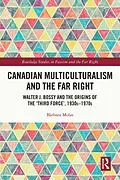Canadian Multiculturalism and the Far Right examines a neglected aspect of the history of 20th century Canadian multiculturalism and the far right to illuminate the ideological foundations of the concept of 'third force'.
Focusing on the particular thought of ultra-conservative Ukrainian Canadian Walter J. Bossy during his time in Montreal (1931-1970s), this book demonstrates that the idea that Canada was composed of three equally important groups emerged from a context defined by reactionary ideas on ethnic diversity and integration. Two broad questions shape this research: first, what the meaning originally attached to the idea of a 'third force' was, and what the intentions behind the conceptualization of a trichotomic Canada were; and second, whether Bossy's understanding of the 'third force' precedes, or is related in any way to, postwar debates on liberal multiculturalism at the core of which was the existence of a 'third force'.
This book will be of interest to students and researchers of multiculturalism, radical-right ideology and the far right, and Canadian history and politics.
Autorentext
Bàrbara Molas holds a PhD from York University, Canada. She is a Postdoctoral Researcher with the Canadian Network for Research on Terrorism, Security and Society (TSAS). She has studied far-right ideology and radicalisation for almost a decade, publishing more than 20 articles and book chapters on the subject, and consulting with institutions such as Facebook (Meta), the London Metropolitan Police, and the European Commission on contemporary right-wing extremism.
Klappentext
Canadian Multiculturalism and the Far Right examines a neglected aspect of the history of 20th century Canadian multiculturalism and the far right to illuminate the ideological foundations of the concept of 'third force'.
Focusing on the particular thought of ultra-conservative Ukrainian Canadian Walter J. Bossy during his time in Montreal (1931-1970s), this book demonstrates that the idea that Canada was composed of three equally important groups emerged from a context defined by reactionary ideas on ethnic diversity and integration. Two broad questions shape this research: first, what the meaning originally attached to the idea of a 'third force' was, and what the intentions behind the conceptualization of a trichotomic Canada were; and second, whether Bossy's understanding of the 'third force' precedes, or is related in any way to, postwar debates on liberal multiculturalism at the core of which was the existence of a 'third force'.
This book will be of interest to students and researchers of multiculturalism, radical-right ideology and the far right, and Canadian history and politics.
Inhalt
1. Introduction
2. Christian Revolutions
3. Allegiances
4. Networks
5. The Third Force
6. Conclusion
